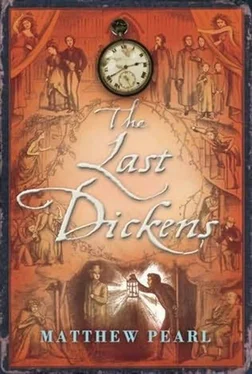“You have had more say than you deserve now. Have a chair and be comfortable while I send for a police coach,” Tom added.
Rogers shook his head. “No. You need my help, gentlemen-your survival may depend on it! Perhaps my own as well, though it may mean nothing to you now!” A glance passed between the two other men that showed no sign of wavering. Rogers, becoming more panicked, now pleaded shamelessly. “My dear Ripley, can't you trust me again? I promise to repay my debt to you for what I have done.”
Osgood directed a heated look at his former companion. “You have earned my trust and sympathy through a bundle of lies. You plotted to disrupt our American tour with Dickens, to lay blame on Mr. Branagan where there was none, to distract my mission here, all under the nefarious orders of those Harpy brothers. I have no doubt Major Harper holds the strings of your current plea, as well. Any minute he will pull you down and set up Judy, or the devil, or some other wooden grotesque to try to lead us astray. Remove yourself from our sight now, while you have your liberty, if Mr. Branagan will allow it.”
Tom took a step back and waved the man to the door. Rogers made no argument this time. “Thank heavens for you, Ripley,” he said. He quietly turned and, hat under his arm, scurried out of the room.
TOM BHANAGAN'S APPEARANCE-and the pistol he had brandished- had been as much a shock to Osgood as the revelation of Rogers's true identity. Once they confirmed that Rogers had left the premises of the hotel, and Rebecca had returned from the bank, Tom set out to tell them of his own winding path that had reunited them. Returning to England after Dickens's reading tour, Tom had continued to be employed in a domestic capacity in the town of Ross at George Dolby's estate. But he tired of the monotony of caring for the Dolby children's much-adored ponies and driving around Mrs. Dolby, who had taken full advantage of their greatly increased wealth since the American tour. Dolby, for his part, had been hardened by what he called the American bullying, and spent their money extravagantly and carelessly, especially after his second son died at only a few days old. Tom occasionally met with Dickens at Dolby's, including at George Dolby Jr.'s christening, but the novelist, though friendly to him, never spoke of the dangerous events of the late American tour.
Tom showed Osgood and Rebecca a pearl-handled switchblade he kept in his pocket. “This was her knife that I took out of her hand. I realized I still had it after we left the country and found it among my clothing. I think about her sometimes when I see it, and I think about what could have happened to the Chief.”
“You should be proud of what you did,” Osgood said.
“I was certain she would die, you know,” Tom said. “You would have been, too, Mr. Osgood, had you seen the blood. The Chief must have thought so, he seemed so sad when he saw her, he even whispered something in her ear to soothe her, though I could not hear what it was. But the truth is that few women attempting suicide in that fashion ever possess the strength to cut their own skin deep enough after they begin. Many survive, as she did, though forever diminished inside and out. Their images from that day will always be with me- Louisa Barton's as much as Charles Dickens's.”
Dulled by his time in Ross and haunted by what had happened in those last hours in Boston, Tom applied to the police at Scotland Yard and waited several months, when a vacancy opened for a night constable third class, the lowest and most endangered tier of the English police. He served his beats from 10 p.m. at night until 6 a.m. This was the only position usually open to an Irishman, though the fact that he could read and write well brought him quick promotion to the place of police constable first class.
Because the Irish were assigned divisional beats in the poorest sections of London, Tom had been one of the constables on patrol alerted to the commotion in the Palmer's Folly court on the night of Osgood's attack. He had been fixing a coalhole that had come dangerously loose in a nearby street. Upon reaching the scene of activity Tom witnessed Rogers fleeing, his head bloodied and injured, and recognized him.
“I knew him as the man who, in his Washington wig and old-fashioned three-cornered hat, started the riot at the ticket sale in Brooklyn that I was blamed for. His appearance in London was remarkable to me, as you'd imagine. I decided to shadow him so that I could discover more, and I found out that he was boarding under an assumed name in an out-of-the-way lodging house. I followed him for several more days, discovering that he had been wiring telegraphs and sending letters back to New York. When I saw him enter this hotel, I examined the guest ledger and was freshly amazed to find your name among the occupants here, Mr. Osgood. I suspected that he had been operating some design of nefarious nature ever since our time in America, but I didn't know if he was a confidence man of some kind, a thief, a brazen murderer.”
“That is why you brought your pistol,” Osgood said.
Tom nodded, putting his pistol aside with a relieved smile. “To be honest, it's lucky that I didn't have to use it. They have issued them to the department because of the Fenian attacks on the government and on the prisons. Because I'm of Irish blood, I have been assigned to infiltrate what's left of the Fenian groups. But the department has only held sporadic training with the pistols, and I have yet to be instructed in them.”
Osgood, in his turn, shared with Tom a full and detailed account of their adventures on the Samaria with Herman and their experiences in England.
Tom pulled the curtains around the room closed as he listened.
“Mr. Branagan, what's wrong?” Rebecca asked. “Do you think someone is watching us?”
Tom leaned both arms on the mantelpiece. In the two years since the American tour, he had grown a full beard and his arms and chest had become more prominent. Any Renaissance sculptor would have been grateful for him as a model.
“The cane you described with the strange gold head that the man called Herman possessed-did you see it up close?” Tom asked.
Osgood nodded. “It was a sort of dragon.”
“Do you remember if it had teeth?”
“Yes,” said Osgood, “sharp as razor blades. How did you know?”
“Herman,” Tom repeated the name to himself. “We must move in secret from now on.”
“You know who that monster is then who attacked Mr. Osgood on the ship?” Rebecca asked.
“The marks on the necks and chests of the bodies of the dead opium fiends-they were almost like fang marks. The police did not know what to think of them.”
“Made by his cane!” Osgood cried. “The beast's head!”
“If you encountered the same man on your steamship, then this was no random attack,” said Tom.
“Then I did not imagine him at the opium room,” Osgood said with a gasp. Even as he said this, Herman's stony visage entered his mind. “He really was there, Miss Sand; you were right, he was never a mere pickpocket! If he was the one who injected me with opium, it must have been him who did the same to poor Daniel. It was Herman that intervened in the attack, killing the Lascar and the Bengalee. He is the devil we must confront to unravel all this! Can the police find him, Branagan?”
“Scotland Yard will not treat the death of two wretched opium eaters seriously. But I don't know if we will have to find him,” Tom said mysteriously.
“What do you mean, Mr. Branagan?” Rebecca asked.
“If I am correct, Miss Sand, the challenge will not be to find him. It will be to avoid him long enough to learn which way this fatal wind blows.”
YAHEE WAS AN opium dealer but not only that. He was said to be the first one of his craft in London, the one to show all the others how to mix and smoke the black ooze. Known by many East Londoners as Jack Chinaman, Yahee occasionally irritated the wrong member of the London police, and when he did, he would usually be put in the cage for begging or some other trifle, since opium itself was not illegal. He was pleasantly surprised when, after the latest incarceration, he was released from prison two weeks early; at first, he thought his internal sense of the calendar had been altered while he was locked away, but he was told the prison was too crowded to feed every ill-mannered Chinaman.
Читать дальше












